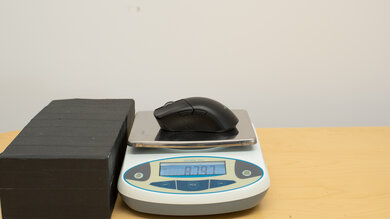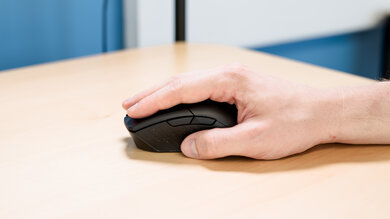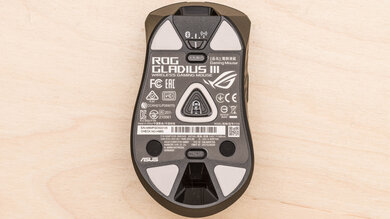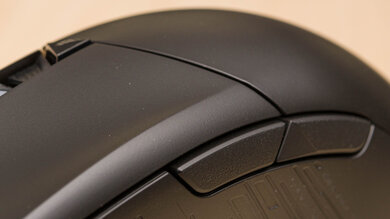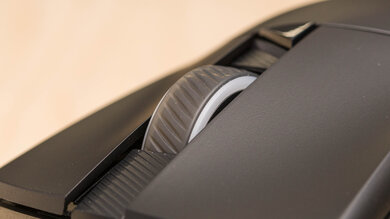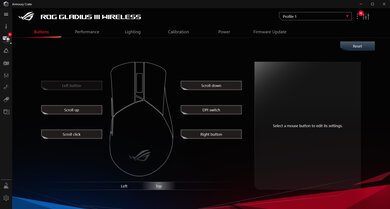The ASUS ROG Gladius III Wireless is a right-handed, wireless gaming mouse with two buttons on its left side. It's suitable for most hand sizes, but small hands may struggle to reach the forward side button using a claw or fingertip grip. It's made of matte black plastic and is somewhat light, and it has RGB zones in the scroll wheel, its left side panel, and palm rest logo. You can connect it via its USB receiver or Bluetooth, and you can pair it with up to three devices. Performance-wise, it has low click latency, a very low lift-off distance, a very wide CPI range, and you can adjust the CPI in increments of 50. Unfortunately, while the sensor on our unit is consistent, it's fairly inaccurate. However, you can offset this by setting your preferred CPI a bit higher to compensate. Also, while you can reprogram most buttons on the mouse, you can't set macros, which may disappoint some users.
Our Verdict
The ASUS ROG Gladius III Wireless is very good for office use. It feels well-built, and it has a right-handed design that's suitable for most hand sizes and any grip type. You can reprogram most buttons, though you can't set macros. You can use it wirelessly via its USB receiver or Bluetooth, and you can pair it with up to three devices. Unfortunately, its scroll wheel lacks L/R tilt inputs and a free-scrolling mode.
- Feels very well-built.
- Suitable for most hand sizes and all grip types.
- Connects wirelessly via USB receiver and Bluetooth.
- Scroll wheel lacks L/R tilt buttons and free scrolling.
The ASUS ROG Gladius III Wireless is great for FPS gaming. It has low click latency over both a wired and receiver connection. It's somewhat lightweight and feels very well-built. It's suitable for all grip types for most hand sizes, but small hands may struggle with a claw and fingertip grip. Its charging cable is paracord-like and flexible, and its mouse feet glide smoothly on desks and mouse pads. Performance-wise, it has a very low lift-off distance and a precisely adjustable CPI within a wide range. Unfortunately, while you can reprogram most of its buttons, you can't set macros.
- Somewhat light.
- Low click latency.
- Feels very well-built.
- Precisely adjustable CPI.
- Sensor is inaccurate, but can be mitigated.
The ASUS ROG Gladius III Wireless is good for MMO gaming, but it doesn't have nearly as many side buttons as a dedicated MMO mouse. That said, you can reprogram most of its buttons to different mouse and keyboard functions, but you can't set macros. On the bright side, it feels very well-built, and it has a right-handed shape that's suitable for most hand sizes with any grip type. Performance-wise, it has low click latency, a very low lift-off distance, and an adjustable CPI within a very wide range.
- Low click latency.
- Feels very well-built.
- Precisely adjustable CPI.
- Doesn't have as many buttons as dedicated MMO mice.
- Sensor is inaccurate, but can be mitigated.
The ASUS ROG Gladius III Wireless is a very good mouse for ultra-light gaming, but while it's lightweight compared to some gaming mice, it's slightly heavier than what we'd consider an ultra-light mouse. It has low click latency, feels very well-built, and has a flexible paracord-like charging cable and smooth-gliding mouse feet. It's suitable for most hand sizes using any grip type, though small hands may struggle to reach the forward side button comfortable while using a claw or fingertip grip.
- Somewhat light.
- Low click latency.
- Feels very well-built.
- Precisely adjustable CPI.
- Sensor is inaccurate, but can be mitigated.
The ASUS ROG Gladius III Wireless is excellent for travel. It's wireless, so you can easily use it in tight spaces without worrying about its cable, and there's a space to store the receiver when it's not in use. All default button functions work on both Windows and macOS, and it has onboard memory. Also, it feels well-built, and it's suitable for most hand sizes using any grip type, but people with small hands may struggle with a claw and fingertip grip.
- Feels very well-built.
- Suitable for most hand sizes and all grip types.
- Connects wirelessly via USB receiver and Bluetooth.
- Slightly bulky; may not fit in laptop cases.
Changelog
- Updated Dec 01, 2022: We've converted this review to Test Bench 1.2. This update simplifies our Weight test and expands on our CPI test from Test Bench 1.1, resulting in changes to test results in both sections. For more details, you can see our complete changelog here.
- Updated Nov 17, 2022: We've converted this review to Test Bench 1.1. This update revamps our Click Latency test and results in changes to test results. For more details, you can see our full changelog here.
- Updated Oct 20, 2021: Review published.
- Updated Oct 15, 2021: Early access published.
Check Price
Differences Between Sizes And Variants
We tested the ASUS ROG Gladius III Wireless in black, and there are no other color variants. While not a variant, there's a wired version called the ASUS ROG Gladius III that's very similar, but it has a different sensor. You can see our unit's label here.
Popular Mouse Comparisons
The ASUS ROG Gladius III Wireless is an update to the ASUS ROG Gladius II Wireless, with a few upgraded aesthetics and performance differences, which include a much lighter weight and rounder edges on its L/R click buttons. Also, its side panels are textured plastic, and there's a laser-etched text pattern on the left side to let RGB lighting pass through. It has some rare features that most gaming mice lack, like hot-swappable L/R click button switches and on-the-fly CPI adjustments using its scroll wheel. It has low click latency, though some people may prefer an even more responsive-feeling option. Unfortunately, while you can reprogram most buttons on the mouse, you can't set macros like you can on other gaming options, which may disappoint some users.
See our recommendations for the best wireless mouse, the best gaming mouse, and the best wireless mouse.
The ASUS ROG Gladius III Wireless and the ASUS ROG Harpe Ace Aim Lab Edition are wireless gaming mice. The Gladius III Wireless has a right-handed shape and better overall build quality. On the other hand, the Harpe Ace Aim Lab Edition has a symmetrical shape and is significantly lighter. It also has better-quality mouse feet, lower click latency, much better sensor performance, and a longer advertised battery life.
The ASUS ROG Keris Wireless and the ASUS ROG Gladius III Wireless are comparable wireless gaming mice. The Keris Wireless is a bit lighter, and it has smoother-gliding mouse feet. Also, it has slightly lower click latency, but the difference may not be noticeable to most people. On the other hand, the Gladius III Wireless has a dedicated CPI-switching button below its scroll wheel. Also, it comes with a USB receiver extender, and it has a lower lift-off distance, a wider CPI range, and a more precisely adjustable CPI.
The Razer DeathAdder V2 Pro and the ASUS ROG Gladius III Wireless are comparable wireless gaming mice with right-handed designs. Both are fairly light, and you can use them wirelessly via Bluetooth or USB receiver or wired with their charging paracord-like cable. However, the Razer has smoother-gliding mouse feet, more programmable inputs thanks to its HyperShift feature, and much lower click latency. On the other hand, the ASUS has a lower lift-off distance, and it feels better built since its body doesn't flex.
The Logitech G502 LIGHTSPEED and the ASUS ROG Gladius III Wireless are both wireless gaming mice. If you prefer heavy mice, the Logitech is the best choice since it weighs more and comes with extra weights. Also, it has a thumb rest, an extra side button, and many more programmable inputs. Also, its scroll wheel has L/R tilt buttons and a free-scrolling mode. It also has slightly lower click latency. On the other hand, the ASUS has Bluetooth support, smoother-gliding mouse feet, and a better charging cable.
Test Results

ASUS advertises that the battery in the ASUS ROG Gladius III Wireless should last up to 55 hours when used with the receiver and up to 85 hours when used over Bluetooth, both with the lighting off. You can pair the mouse with three devices via Bluetooth and cycle through them with the "Pair" button on the underside.
You can program most buttons on the ASUS ROG Gladius III Wireless, excluding the Pair button and Profile button on the underside, as well as the left click. The Pair button lets you switch between three Bluetooth devices, and the button behind the scroll wheel lets you cycle between four CPI settings. You can also adjust the CPI on-the-fly by pressing the CPI button for three seconds and scrolling up and down. The L/R click buttons' switches are hot-swappable, and the mouse comes with alternate switches to replace the proprietary ROG Micro Switch switches already installed.
The polling rate options available on the ASUS ROG Gladius III Wireless are 125Hz, 250Hz, 500Hz, and 1000Hz. When using Bluetooth, the polling rate is limited to 125Hz. Unfortunately, the sensor is very inaccurate, and it undershoot the set CPI by 11.94% during slow movements and 17.22% during fast movements. However, since the sensor is fairly consistent, you can offset the inaccuracy to a degree by setting your preferred CPI to 12-17% higher than you typically would to compensate.
The software for the ASUS ROG Gladius III Wireless appears to have an option for setting macros, but the option is grayed out and doesn't function.





